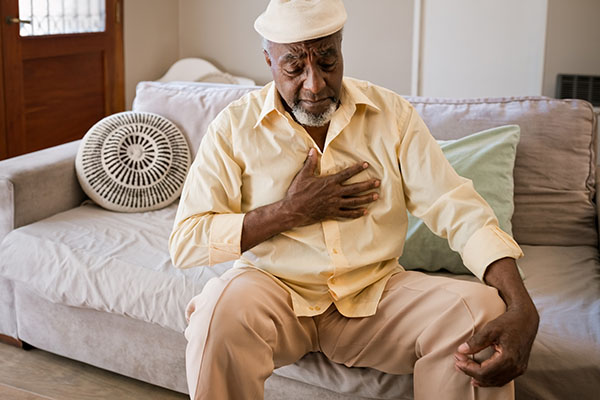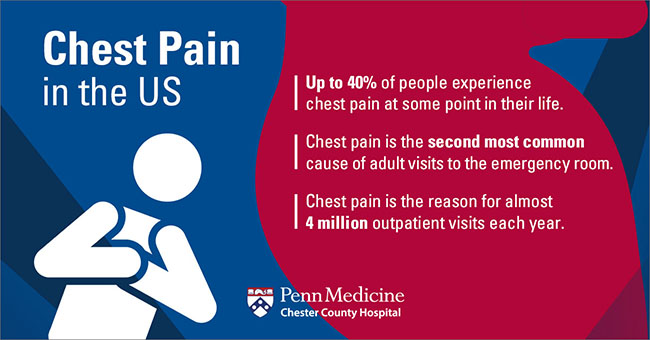
You start to feel
pain in your chest — where does your mind immediately go? If you’re like most people, you might start thinking about a possible
heart attack. And while chest pain can signal a heart attack, that’s not always the case.
Chest Pain — whether it feels like pressure, squeezing, or burning — is a common experience. And because of its seriousness, it leads to many emergency department and healthcare provider visits.

Heart attack is one cause of chest pain, but chest pain can also be a sign of a number of other things going on in your body (some of which are still heart-related). While ruling out a possible heart attack is always the first step, here are some other possible causes of chest pain — and how you can respond.
Non-Cardiac Chest Pain: When It's Not Heart-Related
Your chest area contains more than just your heart. It's also home to other organs and muscles — many of which can cause chest pain.
"Sometimes referred to as non-cardiac chest pain (or chest pain in people who don’t have heart disease), this type of pain can be felt just behind your breast bone. It can feel like squeezing or pressure, and it can last anywhere from seconds to hours," says Brittany Papili, PA-C, Lead Physician Assistant at Chester County Hospital.
Here are some reasons you might experience chest pain that has nothing to do with your heart.
Acid Reflux (GERD)
The most common cause of non-cardiac chest pain is acid reflux, which is also known as gastroesophageal reflux disease (GERD). GERD is when the contents of your stomach rise back up into your esophagus. In addition to chest pain, you might also experience heartburn, regurgitation (when food comes back up without nausea or force), or difficulty swallowing.
"GERD can develop when a part of your esophagus weakens or relaxes when it shouldn't. This can be caused by several factors, such as being overweight, pregnancy, or smoking," explains Papili. Treatment may involve lifestyle changes (like losing weight, sleeping with your head elevated, or quitting smoking), or medication may be required.
Other Food Pipe Disorders
Your food pipe is a muscle, and if it doesn't work properly, it can't do its job. Food pipe-related chest pain can be caused by:
-
Muscle spasms
- Achalasia, which is a lack of movement in the esophagus due to damaged nerve cells
- A sensitive food pipe, which is when changes from acid or pressure (like when you eat or drink) cause chest pain
Because many food pipe disorders are treatable, it is important to talk to your healthcare provider if you are experiencing chest pain that might be related to your food pipe.
Stomach Ulcers
A stomach ulcer — or when the lining of your stomach or intestines develops a raw area or open sore — may be the culprit of your chest pain. Pain usually occurs 1 to 3 hours after a meal (when your stomach is empty), and it may be accompanied by feelings of fullness, nausea, vomiting, weight loss, or bloody or dark, tarry stools.
Stomach ulcers can develop when the digestive juices and the factors that protect your stomach lining are out of balance. This can be caused by:
- Frequent use of ibuprofen, aspirin, naproxen, or other nonsteroidal anti-inflammatory drugs (called NSAIDs)
- Smoking cigarettes or using chewing tobacco
- Drinking excessive amounts of alcohol
- Radiation treatment
- Stress
- Severe illness, such as being on a breathing machine
Stomach ulcers are treated using medication and, in some cases, require lifestyle changes.
Asthma
Over 25 million people in the US have asthma, a disease that makes your airways swollen and inflamed, leading to trouble breathing. While common symptoms include shortness of breath, coughing, and wheezing, you may also experience chest pain.
Asthma attacks — which is when asthma symptoms flare up — can last anywhere from minutes to days. They're generally brought on by a trigger, like pollen, animal allergens or stress. Treating asthma involves avoiding your triggers as well as using medication.
A Lung Infection
Your chest is also home to your lungs, which can develop infections, like pneumonia and bronchitis.
Pneumonia causes the air sacs in the lungs to become inflamed or fill up with pus or fluid, making it difficult to breathe. It can lead to a cough, fever, shortness of breath, and a sharp pain in your chest. Pneumonia is caused by bacteria, virus, or fungi, which comes from the air you breathe. Treatment may include medication or at-home management, such as resting, drinking plenty of fluids, and using a humidifier.
Bronchitis is when the airways of the lungs become inflamed, causing coughing, the production of mucus, and chest pain. It can be short-term (acute), which is caused by a viral infection, like a cold. Or, it can be long-term (chronic), which often occurs because of another condition, like asthma. Treating bronchitis involves at-home symptom management, lifestyle changes (like quitting smoking), and medication.
Panic Attacks
Just like your heart can race when you're excited, you can also feel chest pain from negative emotional experiences, like a panic attack. If you experience frequent panic attacks, this is called panic disorder. Panic attacks come with emotional symptoms, such as overwhelming anxiety, but they can also lead to physical symptoms, such as sweating, trouble breathing and chest pain.
Panic attacks can be genetic, or they can be caused by environmental factors. They're treated using therapy, medication or a combination of the two.
Heart-Related Causes of Chest Pain
While chest pain doesn’t always equal a heart attack, it still might be heart-related. Chest pain that is caused by your heart (or "angina") could also be a symptom of an underlying heart problem, such as:
Any chest pain should always be evaluated by your provider. They can determine if it's heart-related and will be able to determine the next steps in treatment.
Seeking Medical Care for Any Chest Pain
While there are a wide range of conditions that can cause chest pain, it should never be taken lightly. If you are experiencing chest pain and think you may be having a heart attack, seek medical care immediately.
Talk to your healthcare provider if you believe your chest pain might be a sign of another health condition. By keeping the lines of communication open, you can ensure you treat the root of the cause of your chest pain.
Talk to your primary care provider about chest pain and any other symptoms. They can determine if your chest pain is heart-related and utilize resources like the Chester County Hospital Chest Pain Center.
For a fast and easy way to understand more about your heart health, take our online heart risk assessment today.